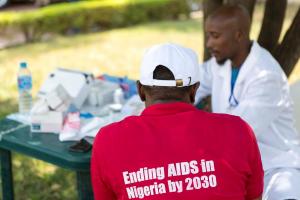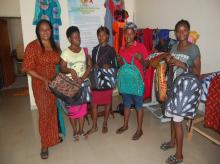HIV initiative ’prevention of mother-to-child transmission’ saves exposed infants in Nigeria
Abuja, 20 May 2019 – “I first discovered I was HIV positive in 1998 when I was pregnant and attended my first antenatal check-up,” says Mrs Lucia Enyia who has lived positively with Human Immunodeficiency Virus (HIV) for 22 years. Adhering strictly to her antiretroviral drug routine and principles of the Prevention of Mother-To-Child HIV transmission (PMTCT) intervention, Mrs Enyia’s three children are all HIV negative.
Reminiscing on her journey to self-acceptance and positive living with HIV, Mrs Enyia says, “Back then, the stigma was too much and there was very little support available for HIV patients in Nigeria. I went to an HIV/AIDs Conference in Durban, South Africa and gathered enough knowledge on PMTCT and living positively with HIV. I take my antiretroviral drugs religiously; I do a lot of exercise and try to eat a healthy diet every day. I’m happy my three children are all HIV negative,” she says.
Owing to her ability to manage the virus without infecting her children or her husband, Mrs Enyia set up a non-governmental organization, ‘Society for Women and Children Living with HIV and AIDS in Nigeria’ (SOWCHAN), with the vision to create awareness about positive living and assist HIV/AIDS orphans, vulnerable children and underprivileged women living with HIV.
Poor indicators require all-inclusive intervention
According to the National Agency for the Control of AIDS (NACA), Nigeria has more HIV-infected babies than anywhere in the world. In 2016, Nigeria accounted for 37,000 of the world’s 160,000 new cases of babies born with HIV. However, since 2017, an estimated 94.9% of infants exposed to HIV by their mothers have been saved from infection through the implementation of the PMTCT intervention under the National AIDS and Sexually Transmitted Infection Control Programme(NASCP) and across the 36 States and Federal Capital Territory, there are a total of 6,301 PMTCT sites.
First introduced in 2001 in Nigeria, the overall goal of the PMTCT is to contribute to the reduction of HIV and AIDS incidences. The national PMTCT aims (as set out in the National HIV/AIDS Strategic plan 2017-2021) at ensuring at least 95% of all HIV positive pregnant women and HIV exposed infants have access to effective antiretroviral (ARV) prophylaxis by 2021. It also aims at ensuring at least 80% of HIV positive pregnant women have access to quality infant feeding counselling and 95% HIV exposed infants have access to Early Infant Diagnosis (EID), (Source: NACA Factsheet 2016 – updated 2019).
The Director General of NACA Dr Sani Aliyu says, “Through the PMTCT intervention, prevention of HIV from mother to child has definitely increased, however, we still have a large chunk of women who do not go to primary health care facilities to deliver. Poverty plays a major role in this and I feel the only way we can get around this is to engage traditional birth attendants, train them in HIV testing, provide them with self-test kits and give them incentives to bring HIV positive women to primary healthcare centres for proper attention.”
Combined efforts to end HIV/ AIDs by 2030
In collaboration with other donors and partners, the World Health Organization (WHO) has been at the forefront of re-establishing the National treatment and PMTCT programme (NTPP) and has continued to provide technical support towards achieving set goals. The WHO is providing evidence-based guidance and recommendations to eliminate mother to child transmission of HIV and Syphilis, strengthen coordination and build capacity of government for quality HIV service delivery.
Dr Clement Peter, WHO Nigeria Officer in Charge (OIC) revealed, “WHO Nigeria in March 2019 donated a vehicle and refurbished NASCP offices towards strengthening the re-established National Treatment and PMTCT which was launched by the Minister in February 2018 with the aim of fast tracking the achievement of the 90-90-90 targets in Nigeria.”
Dr Peter described the three 90s’ of HIV and AIDs as getting everybody to know their HIV status, getting all infected persons in treatment and reducing the viral load on infected patients. He further stated that “WHO will continue to support the Nigerian Government to end the spread of HIV and promote person-centred HIV service delivery as a way to improve service efficiency and impact.”




